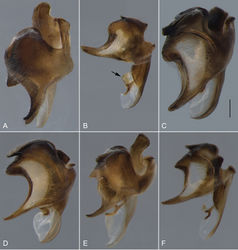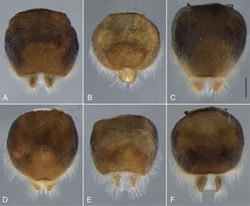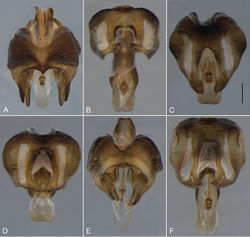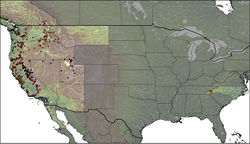Eulonchus halli
| Notice: | This page is derived from the original publication listed below, whose author(s) should always be credited. Further contributors may edit and improve the content of this page and, consequently, need to be credited as well (see page history). Any assessment of factual correctness requires a careful review of the original article as well as of subsequent contributions.
If you are uncertain whether your planned contribution is correct or not, we suggest that you use the associated discussion page instead of editing the page directly. This page should be cited as follows (rationale):
Citation formats to copy and paste
BibTeX: @article{Borkent2016ZooKeys, RIS/ Endnote: TY - JOUR Wikipedia/ Citizendium: <ref name="Borkent2016ZooKeys">{{Citation See also the citation download page at the journal. |
Ordo: Diptera
Familia: Acroceridae
Genus: Eulonchus
Name
Eulonchus halli Schlinger, 1960 – Wikispecies link – Pensoft Profile
- Eulonchus halli Schlinger, 1960: 418
References
Arnaud 1979[1]: 203 (holotype depository); Schlinger 1981[2]: 576 (figs); Poole 1996[3]: 36 (checklist).
Common name
Hall’s Sapphire.
Diagnosis
Proboscis curved and extending beyond abdomen apex (but shorter than wing length), ocellar tubercle bifurcate; calypter margin pale; legs dark brown-black; abdomen dark brown with reddish metallic hue; extensive white pile on thorax and as bands on abdomen.
Redescription
Body length: 9.8–12.0 mm, Wing length 8.0–10.6 mm. Head. Flagellum dark brown, scape and pedicel brown; male flagellum cylindrical, shorter than head height; clypeus elongate, extending beyond oral cavity, shape rounded with raised ridge dorsally, surface glossy black-brown with sparse pubescence; labial palp brown, extending anteriorly beyond proboscis at point of attachment; margin of oral cavity (parafacial) finely pubescent, lacking pile; proboscis length extending to middle of abdomen; ocellar tubercle bifurcate, apices narrowly digitate and sub-parallel, tubercle height taller than width, median ocellus greatly reduced; occiput metallic blue or metallic purple, occipital pile densely white. Thorax. Metallic green, metallic blue or metallic purple in colour, setal pile white; coxae black with metallic blue sheen; femora dark brown, apices white; tibia brown; tarsi brown; calypter margin yellow or light brown, membrane translucent; haltere entirely dark brown. Abdomen. Metallic green, metallic blue violet or black with metallic green sheen, vestiture white, dominant setae erect, other pile posteriorly directed, marginal band of denser setae on T3–4. Male genitalia (Figs 17A, 18A, 19A). Epandrium rectangular, wide at the apex, with posterior margin concave; gonocoxite deeply emarginate along anterior margin, fenestrae lacking; aedeagus thinned at the apex, only slightly sclerotized.
Type material examined
Holotype male, CAS, “Riverside/ Cal. Mar 7, 34” [white]; “Timberlake/ Coll.” [white]; “on Cryptantha/ intermedia” [white]; “HOLOTYPE/ Eulonchus/ halli/ ♂ Schlinger” [orange]; “Genitalia 51-3-id/ Dissection No./ by E.I. Schlinger” [white]; “California Academy/ of Sciences/ Type No. 6392” [white]; “IMAGE” [green]; “CAS/ Dec-07” [green]; specimen condition: good, proboscis, right flagellum and right front leg broken off and glued to a paper triangle on pin with specimen. Body length: 10.2 mm, Wing length: 9.2 mm.
Other material examined
Listed in Table 3 (Suppl. material 1).
Distribution
(Fig. 20). Nearctic: Southern California (USA) to Baja California (Mexico).
Ecology
Schlinger (1960)[4] notes that this species has a relatively short adult flight period (ca. six weeks) during spring and has a feeding preference on Cryptantha intermedia flowers (Table 2).
Biology
The larval host for this species is unknown.
Comments
Eulonchus halli is a distinctive species that can be distinguished by the dark leg and body colouration, erect white thoracic and abdominal pile, raised bifurcate ocellar tubercle, and a curved proboscis that is shorter than the body length.
Taxon Treatment
- Borkent, C; Gillung, J; Winterton, S; 2016: Jewelled spider flies of North America: a revision and phylogeny of Eulonchus Gerstaecker (Diptera, Acroceridae) ZooKeys, (619): 103-146. doi
Images
|
Other References
- ↑ Arnaud P (1979) A catalog of the types of Diptera in the collection of the California Academy of Sciences. Myia 1, 505 pp.
- ↑ Schlinger E (1981) Acroceridae. In: McAlpine J Peterson B Shewell G Teskey H Vockeroth J Wood D (Eds) Manual of Nearctic Diptera. Vol. I. Research Branch, Agriculture Canada, Ottawa, Monograph 27: 575–584.
- ↑ Poole R (1996) Diptera, Lepidoptera, Siphonaptera. Nomina Insecta Nearctica. A checklist of the insects of North America. Vol. 3. Entomological Information Service, Rockville, 1143 pp.
- ↑ Schlinger E (1960) A review of the genus Eulonchus Gerstaecker. Part I. The species of the smaragdinus group (Diptera: Acroceridae). Annals of the Entomological Society of America 53: 416–422. doi: 10.1093/aesa/53.3.416





